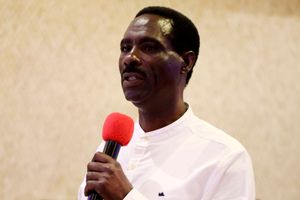
Education Cabinet Secretary Julius Ogamba.
Learners in Grade 9 and their parents remain in the dark following delays by the Ministry of Education to release crucial guidelines for them to select the senior schools and pathways they wish to pursue from January 2026.
This is the first time learners will select schools based on the career pathways they offer since the competency-based education (CBE) was rolled out.
Before the learners closed for the April holidays, the ministry had indicated that the selection would begin on May 20, 2025.
However, during a national conference on CBE held earlier in May, the director for secondary education at the Education ministry, William Sugut, announced that learners would select the schools from May 26 to June 15, 2026.
The Saturday Nation has established that the selection has not kicked off and many learners and their parents have no clue on how it will be conducted.
When we reached out to top education officials at the ministry, there was no clarity on when the guidelines will be released despite the Cabinet Secretary stating publicly that the process had begun and was going on smoothly.
The national chair of the Kenya Primary Schools Head Teachers Association (Kepsha), Fuad Ali, stated that schools have not yet received the official guidelines from the ministry.
He noted that while they have already begun providing general information to parents and learners, the ministry has only indicated that the guidelines will be issued “soon”.
He also said that the senior school selection process has not yet commenced.
“We are still waiting for clear directions from the Ministry of Education to open the portal. So far, we’ve only started talking to parents. Some learners are aware of what they are going to choose,” said Mr Ali.

Kenya Primary School Heads Association chairperson Fuad Ali.
Under the CBE, learners transitioning to senior school are expected to study seven subjects - four core and three optional - aligned with their chosen pathways: Science, technology, engineering and mathematics (STEM), social sciences, or arts and sports science.
Schools will now be classified as either triple or double pathway institutions. Triple pathway schools will offer three career pathways - STEM; social sciences; and arts and sports - while double pathway schools will provide STEM and one of the other two.
However, specific information has not been released to the learners, with only five months left before they undertake the Kenya Junior School Education Assessment.
There was a contradiction as the Education Cabinet Secretary Julius Ogamba, maintained that the transition from Junior School to Senior School was progressing smoothly.
He stated that the ministry had already developed transition and placement guidelines in collaboration with stakeholders and that the process of making Senior School choices by Grade 9 learners was proceeding without any issues.
“As a Ministry, we are extremely impressed that the process of transitioning of learners from Junior School to Senior School next year is going on smoothly.
"Having successfully developed transition and placement guidelines, together with all stakeholders, earlier this year, I am happy to announce that the exercise of making Senior School choices by our current Grade 9 learners is going on without a hitch,” he said during the 28th graduation ceremony for Tambach Teachers Training College on Friday.

Education Cabinet Secretary Julius Migos Ogamba when he appeared before the National Assembly Committee on Health at Parliament Buildings, Nairobi on April 24, 2025.
He also directed heads of Junior Schools to ensure career masters work with parents to guide learners in making informed decisions.
However, a senior official in the ministry, who spoke in confidence as he is not authorised to publicly comment on the issue, clarified that what is going on now is the “sensitisation of the guidelines” - with parents, learners and teachers targeted - before the actual selection happens at the end of second term.
Also Read: Mathematics needs to be a compulsory subject
In the new plan, learners will select a total of 12 schools.
This is based on the first subject combination before being guided to select four senior schools.
These include: a day school, a boarding from their home county and two others (boarding) from outside their home county.
The same process will be repeated for the second and third subject combinations of the learner to give room for flexibility - bringing the total number of schools to 12.
In terms of accommodation out of the 12 schools, nine should be boarding.
Three of them will be from the learner’s home county while six will be from the outside the county.
Learners will also select three day schools from their sub-county of residence.
The deputy secretary-general of the Kenya Union of Post Primary Education Teachers (Kuppet), Moses Nthurima urged the ministry to urgently provide direction to teachers as learners await the selecting their academic pathways under the new curriculum.
“When are learners choosing the pathways? They need the assistance of the teachers but we are not sure how to assist the learners.
"The ministry needs to move fast and help teachers through inductions on how to identify areas that learners will socialise with. The teachers are still in the dark on the guidelines on how to guide learners on (subject) choices,” said Mr Nthurima.
His counterpart at the Kenya National Union of Teachers (Knut), Collins Oyuu, urged the ministry to communicate clearly on the ongoing education reforms, saying parents’ concerns about changes like the integration of Grade 9 into comprehensive schools come from poor communication.
He warned that silence from the ministry fuels unnecessary panic and called on senior officials to regularly address public concerns to prevent misinformation.

Kenya National Union of Teachers (Knut) Secretary-General Collins Oyuu.
“The ministry must speak. When they remain silent, panic spreads among parents like bushfire. When we raised concerns about Grade 9 being merged into comprehensive schools, Dr Belio Kipsang (former Principal Secretary for Basic Education) responded - and the noise stopped.
"Let the ministry talk. The situation might not be as bad as it seems, but silence makes it worse. Parents should not be worried all the time. Any new education system comes with challenges - we saw the same fears during the rollout of 8-4-4 and again with CBC,” said Mr Oyuu.
Teachers working in arid and semi-arid regions expressed concern over the selection of pathways in senior secondary schools, warning that learners in hardship areas risk being left behind if the Ministry of Education does not introduce special considerations for them.
Way forward
“We are asking the ministry to give a way forward, it’s June already and we don’t know how the learners are going to choose their pathways.
"Normally, when the ministry rolls out something, there is always a rush and because of the conditions of these learners, we fear they might miss out because our schools in far-flung areas with no electricity, internet, or adequate guidance?
"How do those learners get to make informed choices on whether to pursue STEM, Arts or Social Sciences?” said Wangonya Wangenye, the national secretary of the Kenya Teachers in Hardship and Arid Areas Welfare Association.
The chair of the National Parents Association, Silas Obuhatsa, said collaboration among key stakeholders in the education sector is important to ensure learners’ success, especially as the examination period approaches.

National Parents Association Chairman David Obuhatsa Silas (centre) and other members of the association.
“I want to keep on recognising parents, to keep on watching out for the guidelines to prepare for their exams - assuming that the governmen,” he said.








